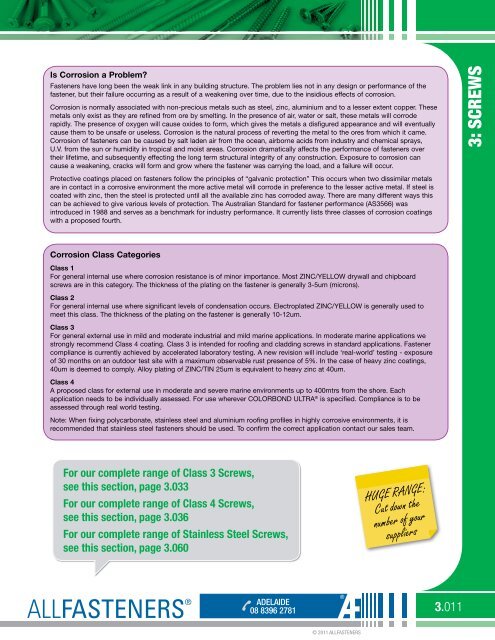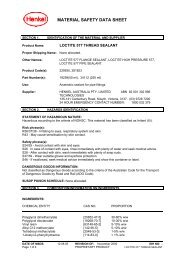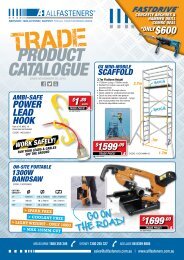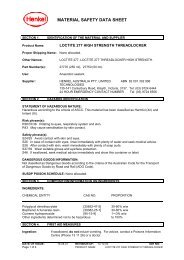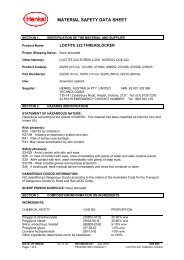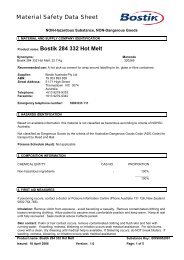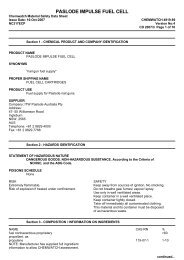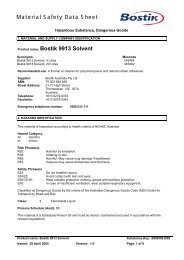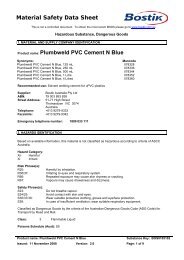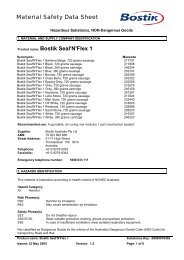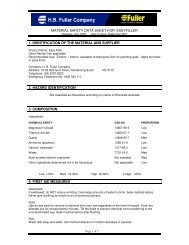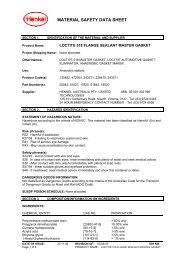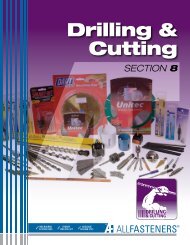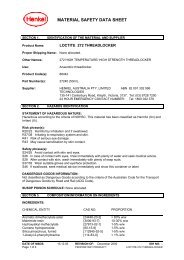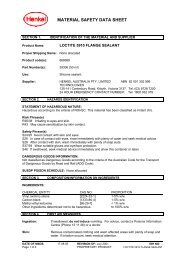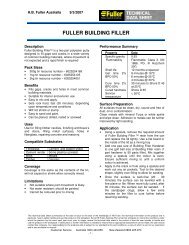Screws - All Fasteners
Screws - All Fasteners
Screws - All Fasteners
You also want an ePaper? Increase the reach of your titles
YUMPU automatically turns print PDFs into web optimized ePapers that Google loves.
Is Corrosion a Problem?<br />
<strong>Fasteners</strong> have long been the weak link in any building structure. The problem lies not in any design or performance of the<br />
fastener, but their failure occurring as a result of a weakening over time, due to the insidious effects of corrosion.<br />
Corrosion is normally associated with non-precious metals such as steel, zinc, aluminium and to a lesser extent copper. These<br />
metals only exist as they are refined from ore by smelting. In the presence of air, water or salt, these metals will corrode<br />
rapidly. The presence of oxygen will cause oxides to form, which gives the metals a disfigured appearance and will eventually<br />
cause them to be unsafe or useless. Corrosion is the natural process of reverting the metal to the ores from which it came.<br />
Corrosion of fasteners can be caused by salt laden air from the ocean, airborne acids from industry and chemical sprays,<br />
U.V. from the sun or humidity in tropical and moist areas. Corrosion dramatically affects the performance of fasteners over<br />
their lifetime, and subsequently effecting the long term structural integrity of any construction. Exposure to corrosion can<br />
cause a weakening, cracks will form and grow where the fastener was carrying the load, and a failure will occur.<br />
Protective coatings placed on fasteners follow the principles of “galvanic protection” This occurs when two dissimilar metals<br />
are in contact in a corrosive environment the more active metal will corrode in preference to the lesser active metal. If steel is<br />
coated with zinc, then the steel is protected until all the available zinc has corroded away. There are many different ways this<br />
can be achieved to give various levels of protection. The Australian Standard for fastener performance (AS3566) was<br />
introduced in 1988 and serves as a benchmark for industry performance. It currently lists three classes of corrosion coatings<br />
with a proposed fourth.<br />
Corrosion Class Categories<br />
Class 1<br />
For general internal use where corrosion resistance is of minor importance. Most ZINC/YELLOW drywall and chipboard<br />
screws are in this category. The thickness of the plating on the fastener is generally 3-5um (microns).<br />
Class 2<br />
For general internal use where significant levels of condensation occurs. Electroplated ZINC/YELLOW is generally used to<br />
meet this class. The thickness of the plating on the fastener is generally 10-12um.<br />
Class 3<br />
For general external use in mild and moderate industrial and mild marine applications. In moderate marine applications we<br />
strongly recommend Class 4 coating. Class 3 is intended for roofing and cladding screws in standard applications. Fastener<br />
compliance is currently achieved by accelerated laboratory testing. A new revision will include ‘real-world’ testing - exposure<br />
of 30 months on an outdoor test site with a maximum observable rust presence of 5%. In the case of heavy zinc coatings,<br />
40um is deemed to comply. <strong>All</strong>oy plating of ZINC/TIN 25um is equivalent to heavy zinc at 40um.<br />
Class 4<br />
A proposed class for external use in moderate and severe marine environments up to 400mtrs from the shore. Each<br />
application needs to be individually assessed. For use wherever COLORBOND ULTRA ® is specified. Compliance is to be<br />
assessed through real world testing.<br />
Note: When fixing polycarbonate, stainless steel and aluminium roofing profiles in highly corrosive environments, it is<br />
recommended that stainless steel fasteners should be used. To confirm the correct application contact our sales team.<br />
For our complete range of Class 3 <strong>Screws</strong>,<br />
see this section, page 3.033<br />
For our complete range of Class 4 <strong>Screws</strong>,<br />
see this section, page 3.036<br />
For our complete range of Stainless Steel <strong>Screws</strong>,<br />
see this section, page 3.060<br />
AdelAide<br />
08 8396 2781<br />
© 2011 <strong>All</strong>FASTeNeRS<br />
HUGE RANGE:<br />
Cut down the<br />
number of your<br />
suppliers<br />
3.011<br />
3: SCREWS


